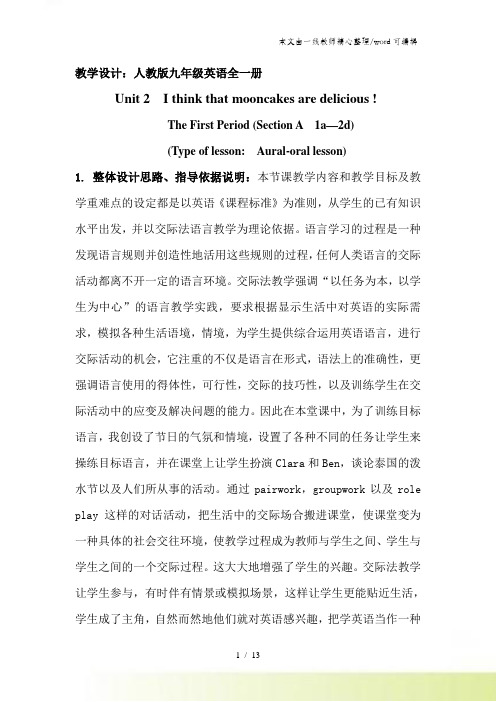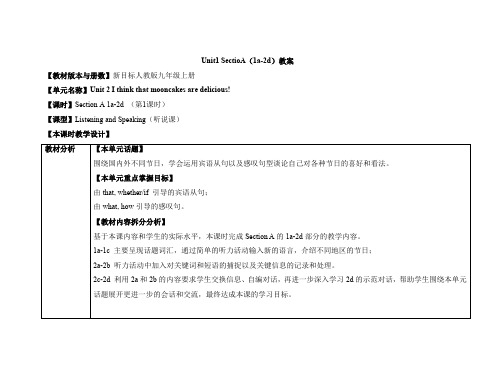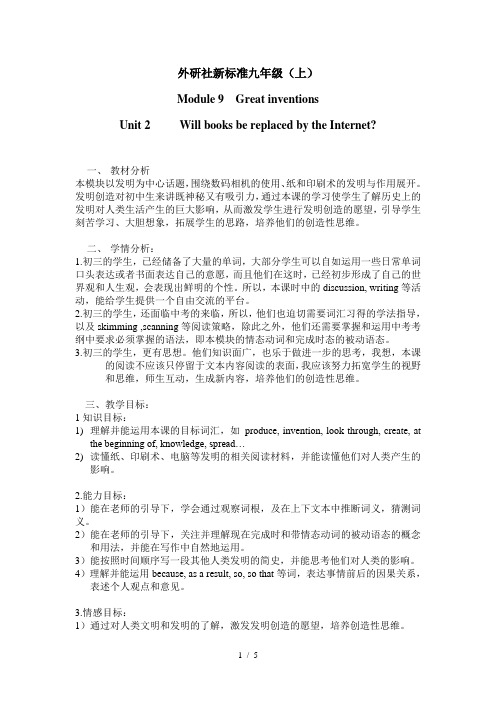九年级unit2教案(1)
外研版九年级英语上册教案 Module1 Unit2 (1)

Listen and read quickly and choose the paragraph for each title.
Step6
Readagainand choose the correct answer.
Step7
Knowledge Extension:The Seven Natural Wonders of the World
Vocabulary
shine, sign, silent, sky, grey, beside, reply, clear, nearly, remain
get out of, go through, fall away, on top of,look across
Periods
1
Procedure
Lead-in
Review.Translate the phrasesin Unit 1into English.
Step 1
Free talk. Show some adjectives and ask Ssto describe a building, a mountain, a river, a waterfall or a tower.
Unit2The Grand Canyon was not just big.
Class Type
Reading and writing
Objectives
Tounderstand the passage about the trip to theGrand Canyon;
To know the way of writing about what you see and your feelings when trvelling.
人教版九年级全册第二单元Section A 1a2d教案

教学设计:人教版九年级英语全一册Unit 2 I think that mooncakes are delicious !The First Period (Section A 1a—2d)(Type of lesson: Aural-oral lesson)1. 整体设计思路、指导依据说明:本节课教学内容和教学目标及教学重难点的设定都是以英语《课程标准》为准则,从学生的已有知识水平出发,并以交际法语言教学为理论依据。
语言学习的过程是一种发现语言规则并创造性地活用这些规则的过程,任何人类语言的交际活动都离不开一定的语言环境。
交际法教学强调“以任务为本,以学生为中心”的语言教学实践,要求根据显示生活中对英语的实际需求,模拟各种生活语境,情境,为学生提供综合运用英语语言,进行交际活动的机会,它注重的不仅是语言在形式,语法上的准确性,更强调语言使用的得体性,可行性,交际的技巧性,以及训练学生在交际活动中的应变及解决问题的能力。
因此在本堂课中,为了训练目标语言,我创设了节日的气氛和情境,设置了各种不同的任务让学生来操练目标语言,并在课堂上让学生扮演Clara和Ben,谈论泰国的泼水节以及人们所从事的活动。
通过pairwork,groupwork以及role play这样的对话活动,把生活中的交际场合搬进课堂,使课堂变为一种具体的社会交往环境,使教学过程成为教师与学生之间、学生与学生之间的一个交际过程。
这大大地增强了学生的兴趣。
交际法教学让学生参与,有时伴有情景或模拟场景,这样让学生更能贴近生活,学生成了主角,自然而然地他们就对英语感兴趣,把学英语当作一种乐趣。
本课还运用任务型教学方式。
任务型教学就是以具体的任务为学习动力或动机,以完成任务的过程为学习的过程,以展示任务成果的方式来体现教学的成就。
本节课教学行为的每一个步骤都是在完成不同任务中进行的。
如:1a, 将图片与文字描述相联;1b, 2a, 2b听力训练后,完成不同任务的练习;1c, 2c, 2d 都是编对话、完成角色表演的任务等。
仁爱版九年级英语上册Unit2Topic1SectionB教案

仁爱版九年级英语上册Unit2Topic1SectionB教案Unit 2 Saving the EarthTopic 1 Section B教案教学目标1.知识与能力目标Words and phrases: pain, produce, awful, bear, harmful, chest, editor, breathe/breath, soil get a pain in…, what’s worse, too much noise, too many problems, breathing problem, be harmful to, make a mess of, throw…aroundSentences: It’s difficult for me to breathe./ I’ve got a pain in my throat./ It’s really awful.A: How long have you been like this? A: Have you seen a doctor?B: I’ve been like this since la st week. B: Not yet.Grammar: Present Perfect (past participle和疑问句的问答).2.过程与方法通过谈论环境问题,让学生了解不同种类的污染及其危害。
3.情感态度与价值观引导学生关注环境问题,树立绿色环保意识,增强忧患意识和社会责任感。
教学重点1. some new words and useful phrases; the present perfect tense2. the present perfect tense教学过程Step 1 Review1. go over the phrases in section A2. Guide the Ss to discuss different kinds of pollution ingroups and share the answer together. Step 2 Presentation1. Watch the flash, then answer the questions below.1) Does Bruce look well?2) What’s wrong with him?3) How long has he been like this?4) Has he seen a doctor?2. Show a picture of the polluted West Hill, let the Ss listen to 1a once and tick the questions they hear in part A of 1b. Then check the answers together.A. Listen to 1a and check the questions you hear.1) What’s wrong with you?2) How long have you been like this?3) Where have you been?4) Have you seen a doctor?5) Have you noticed the dead fish in the river?B. Listen again and match each question above with an answer below.3. Read 1a and answer the questions.1) What caused Mrs. Zhou’s problems?2) What will Kangkang do?Step 3 Consolidation1.分角色朗读2a,选择四组进行比赛,激发学生朗读兴趣。
人教版英语9年级全册Unit2_SectionA(1a-2d)教案

1.学生是否能听懂目标词汇与基本句型。
2.学生是否能用目标词汇回答问题。
3.学生是否能通过听音模仿朗读课文
DELC6
3
深度加工知识
Step 4
Post-
listening(听后)
(5 mins)
Step 5
Pre --listening(听前)
(3mins)
1c Talk about the festival in 1a.
A: I guess the food was delicious, right?
Ss make their own conversations with his or her partner. Then let some pairs act out their conversations.
创编新的对话,巩固拓展学生词汇及语言能力。
The Mid-Autumn Festival
The Chinese Spring Festival
The Water Festival
教授核心句型
Ilike…best, I think that…
教授核心短语
The Lantern Festival
The Mid-Autumn Festival
The Chinese Spring Festival
friends.
3.Wu Ming visited hisrelatives/ friends/
Classmates.
4.Wu Ming liked eating out/ shopping/
The Dragon Boat Festival best.
2.Check the answers wie exercises together.
外研版九年级英语上册 Module 9 unit2 .教案 (1)

外研社新标准九年级(上)Module 9 Great inventionsUnit 2 Will books be replaced by the Internet?一、教材分析本模块以发明为中心话题,围绕数码相机的使用、纸和印刷术的发明与作用展开。
发明创造对初中生来讲既神秘又有吸引力,通过本课的学习使学生了解历史上的发明对人类生活产生的巨大影响,从而激发学生进行发明创造的愿望,引导学生刻苦学习、大胆想象,拓展学生的思路,培养他们的创造性思维。
二、学情分析:1.初三的学生,已经储备了大量的单词,大部分学生可以自如运用一些日常单词口头表达或者书面表达自己的意愿,而且他们在这时,已经初步形成了自己的世界观和人生观,会表现出鲜明的个性。
所以,本课时中的discussion, writing等活动,能给学生提供一个自由交流的平台。
2.初三的学生,还面临中考的来临,所以,他们也迫切需要词汇习得的学法指导,以及skimming ,scanning等阅读策略,除此之外,他们还需要掌握和运用中考考纲中要求必须掌握的语法,即本模块的情态动词和完成时态的被动语态。
3.初三的学生,更有思想。
他们知识面广,也乐于做进一步的思考,我想,本课的阅读不应该只停留于文本内容阅读的表面,我应该努力拓宽学生的视野和思维,师生互动,生成新内容,培养他们的创造性思维。
三、教学目标:1知识目标:1)理解并能运用本课的目标词汇,如produce, invention, look through, create, atthe beginning of, knowledge, spread…2)读懂纸、印刷术、电脑等发明的相关阅读材料,并能读懂他们对人类产生的影响。
2.能力目标:1)能在老师的引导下,学会通过观察词根,及在上下文本中推断词义,猜测词义。
2)能在老师的引导下,关注并理解现在完成时和带情态动词的被动语态的概念和用法,并能在写作中自然地运用。
Unit2Ithinkthatmooncakesaredelicious单元教案人教版九年级英语全册

Step 3Grammar Focus1.Ask the students to read the sentences in the grammar box.2.Show the questions and answers in the left column on PPT and circle the words “that” “if” “whether” in each sentence.Then explain the usage of objective clause to students.3.Show the questions and answers in the right column on PPT and circle the words “what” “how” in each sentence.Then explain the usage of exclamatory statements to students.4.Then ask the students to practice the sentences in the grammar box.Step 4Work on 4a,4b & 4c4a:(1)Make sentences and write them in the books.And correct them with the partners.(2)The whole class read aloud the sentences.Help with the pronunciation and intonation.4b:(1)Read the instructions and know what to do.Then read the letter quietly and underline the objective clauses.(2)Check the answers and read out the sentences with objective clauses.(3)Ask students to write their own sentences about Mother's Day and Father's Day.The teacher shows:I know…;I think…;I believe…;I wonder…4c (The students may finish it after class.):(1)The teacher shows the chart:Name Favorite festival Reasons(2)Interview their partners.(3)Write a report to tell the class.Step 5Homework1.Remember the words and phrases in this lesson.2.Interview more students about their favorite festivals after class.3.Write a report about the results of the interview.Spring Festival,the Mid-Autumn Festival,the Lantern Festival,the Dragon Boat Festival) and foreign festivals (Thanksgiving Day,April Fool's Day,Christmas,Halloween) to play a guessing game.Then ask some students to tell the dates of the four foreign festivals.Step 2Presentation(1a)1.Ask students to look at pictures and words related to Halloween in 1a.2.Learn some words and expressions:spider,dress up as,haunted,ghost,trick,treat.3.Ask some students “What do you think this festival is about?”Step 3Listening(1b~1c)1b:Listening skill:pay attention to the key words(1)Play the tape for the first time.Ask the students to master the whole conversation.Then answer the questions in 1b.(2)Discuss the questions and check the answers.1c:(1)Scan these sentences with blanks.(2)Play the recording again.Remind them of the details.Students fill in the blanks.(3)Play the recording for the third time and check the answers.Read aloud the sentences.Step 4Pair work(1d)Think about the Halloween activities that interest you most.Discuss what you have learned with a partner.(Ask students to discuss the Halloween activities with partners and make a conversation.)Step 5Group work1.Discuss in groups and create a mind map about Halloween.2.Make a report like this:Halloween is a popular festival in North America…Step 6Homework1.Remember the words and phrases in this lesson.2.Write a passage about a festival you like,including information about where,when,what to do and what you like best about it.the Ghost of Christmas Past?He sees his happier days as a child.the Ghost of Christmas Present?He sees how others are spending Christmas.the Ghost of Christmas Yet to e?He sees that he is dead,but nobody cares.4.Then ask students to read the passage more carefully again,and focus on the details.Try to find out the answers to the questions in 2d.(1)Why does Scrooge hate Christmas?(2)Does Scrooge have a lot of friends? Why or why not?(3)Why was Jacob Marley punished after he died?(4)Does Jacob Marley want to help Scrooge? How do you know?(5)How does Scrooge feel when he wakes up on Christmas Day?(6)What does Scrooge do after seeing the three spirits?After reading1.Ask the students to read the passage again and find some key words and sentences.In pairs or in groups they discuss firstly.After that,the teacher should emphasize something important and difficult.2.Ask the students a question:What do you think the three ghosts say to Scrooge when they visit him?In groups of four,the students make a conversation between the three ghosts and Scrooge.Then act out the conversation.Step 4Review and retell the story.1.Read the text again and then finish the following mind map.(1)Charles__Dickens(2)Scrooge(3)Jacob__Marley (4)change__his__ways (5)Three2.Retell the story using his/her own words according to the mind map.Step 5Homework1.Remember the words and phrases in this lesson.2.Finish the reading part in your workbook.Unit 2I think that mooncakes are delicious!。
人教新目标九年级英语Unit 2 全单元教案
义务教育基础课程初中教学资料Unit 2 I think that mooncakes are delicious! 教案【教学目标】1语言目标:掌握本单元词汇,听懂、掌握谈论中外不同国家文化的语言材料。
2 技能目标:能听懂语言材料,掌握听的技巧;能读懂介绍中外不同文化的文章。
3 情感目标:通过开展角色表演等活动,培养学生阅读兴趣。
通过本单元的阅读,培养学生的文化意识,陶冶思想情操。
【教学重点】(1) 短语:Section A 1the Water Festival, the Dragon Boat Festival, Spring Festival, the Lantern Festival, watch the races, a little crowded, like best, go…for one’s vacation, enjoy doing sth., eat out, five meals a day, put on, in two weeks, sound like, from…to…, be similar to, throw water at each other, wash away, have good luck, in the new yearSection A 2celebrate Middle-Autumn Festival, the shape of, carry …to…, shoot down, plan to do sth., try to do sth., refuse to do sth., fly up, so…that…,call out, lay out, start the tradition ofSection A 3one…, the other…, give…to…,take out, more and more popularSection B 1dress up, care about, make money, used to, end up, warn sb. to do sth., expect sb. to do sth., wake up, find out, decide to do sth., promise to do sth., in need,Section B 2introduce sb., make sb. do sth., give birth to life, not only…but also…(2) 句子:Section A 1Bill thinks that the races were not that interesting to watch.Bill wonders whether they’ll have the sweet rice dumplings again next year.What do you like best about the Dragon Boat Festival?What did you do on your vacation?But I believe that April is the hottest month of the year there.I wonder if it’s similar to the water festival of Dai people in Yunnan Province.Section A 2Chinese people have been celebrating Middle-Autumn Festival and enjoying mooncakes for centuries.They carry people’s wishes to the families they love and miss.However, most people think that the story of Chang’e is the most touching.Whoever drank this could live forever.Hou Yi was so sad that he called out her name to the moon every night.How he wished that Chang’e could come back!Section A 3Do you know that there are two special days for parents in America?I believe that there are many ways to show our love.It is also a good idea to help parents to do something instead.Section B 1Many would agree that when we think of Christmas, we probably think of gifts, Christmas trees and Santa Claus.A Christmas Carol is a famous novel written by Charles Dickens.He just cares about whether he can make more money.Marley used to be just like Scrooge, so he was punished after he died.He now treats everyone with kindness and warmth, spreading love and joy everywhere he goes.Section B 2Not only do people spread them around in different hiding places for an egg hunt, but they also give out these treats as gifts.【教学难点】1. 学会运用宾语从句来表达句子。
外研版九年级英语上册教案 Module1 Unit2 (1)
多媒体课件
教 学 过 程
二次设计
Step 1
Warming
up and
leading in.
(Act. 1)
1. Ask the students to work in pairs and talk about a great wonder.
2. Show the following questions on the screen.
5. I didn’t r_______long in that city. I came back after two days.
Ⅱ.用所给词的适当形式填空
1. Why did you keep_______(silence) at the meeting? Didn’t you have anything to say?
3. Try to find passages with facts to read.
教学反思
本节课的教学设计, 抓住学生的好奇心理, 活化我们的英语教材, 透过扩展教材资料或活动步骤, 充分激发他们勤于思考、敢于创新的兴趣, 鼓励他们多角度、多方向、新颖独特的提出问题、解决问题; 提倡一题多议, 敢破常规, 使教学向纵深发展。其次, 抓住了阅读技巧, 课堂教学方明确向, 加强学生实际练习、多运用, 确立以“知识理解型”教学模式向“思维训练型”教学模式的转变。
⑤Far below me, the ground fell away and down to a river.
教学难点
1. Get the key information quickly from the reading material.
2. Know how to write about what you see and your feeling when you travel.
仁爱版英语九年级上册unit2教案
仁爱版英语九年级上册unit2教案教案要面向全体学生,关注每个学生的情感,激发他们学习英语的兴趣,帮助他们建立学习的成就感和自信心,使他们在学习过程中发展综合语言运用能力,下面是我给大家整理的仁爱版英语九年级上册unit2教案5篇,希望对大家能有所帮助!仁爱版英语九年级上册unit2教案1Unit1TheDevelopingWorldTopic1ChinahasdevelopedrapidlyInrecentyears.SectionAThemainactivityis1a.本课重点活动是1a。
Ⅰ.Teachingaimsanddemands教学目标1.Learnsomenewwordsandaphrase:proper,bytheway,bell,grandpa,chairwoman,grandson2.Learnausefulsentence:Theregoesthebell.3.Learnthepresentperfecttense:(1)Rita,youhavejustcomebackfromyourhometown.(2)—Wherehaveyoubeen,Jane?—IhavebeentoMountHuangwithmyparents.(3)—Bytheway,where’sMaria?—ShehasgonetoCubatobeavolunteer…4.Taltthechildren’svacationexperiences.Ⅰ.Teachingaids教具录音机/小黑板/学生的旅游纪念照/图片/幻灯片Ⅰ.Five-fingerTeachingPlanStep1Review通过教师询问学生的暑期活动,导入话题,呈现部分生词。
T:Listen!Thebellisringing.Let’sbeginourclass!(教师解释Thebellisringing等于Theregoesthebell,板书bell,要求学生掌握。
人教版九年级英语上册教案 unit2第一课时
Unit2 I used to be afraid of the darkTeaching and Learning Goals:Learn how to read the new words in the unit and practice the use of some words, for example,used to do sth,be terrified of and so on. In this class, try to learn and practice talking about the changes of the people ,the place or other things between the past and the present. Try to spell the words in this unit. Teaching and learning stepsStep 1 Learn to read the words1.First get the students to try to read the new words in this unit according to the phonetics given by themselves and underline the difficulties they meet.2.Then give them a few minutes to deal with the problems they have in their pronunciation in pairs or groups.3.Next,get individual students to read the new words to the class, the others listen. If possible ,the teacher gets the student to correct some pronunciations .When necessary, the teacher should correct the mistakes himself or herself.st, get the students to read the words twice after the tape . Then give thema few more minutes to read all the words quickly to consolidate the pronunciation. Step 2 : Learn to remember words一.Remember the words by describing the pictures given about different activities1. fly in an airplane2. go to sleep3. eat candy4. watch spiders and other insects5.chew gum6. chat online7. read comics二. Remember the phrases by matching itself with its meaning.1. be terrified of 非常害怕的2. in the end 最后,终于3. to one’s surprise 令人吃惊的是4. even though 即使,尽管5.no longer 不再6.take pride in 对---- 感到自豪7.pay attention to 对---- 注意8. give up 放弃三.Remember the words in different groups.1.同义短语be afraid of ---- be terrified ofin the end ----- at last --- finallymake a decision to do ---- decide to doeven though ---- even ifno longer----not any longertake pride in ----- be proud ofgo to sleep ---- fall asleep2.同义词daily --- everyday airplane --- plane3.词形变化terrify(动词)-terrifying (形容词,令人恐惧的)-terrified(形容词,恐惧的)die(动词) --- dead (形容词)---- death (名词)--- dying(形容词,现在分词)patient(形容词)---- patience(名词,耐心)(Get the students to summarize the similar changing of the words.important--- importance different ---- difference)exact (形容词)------ exactly(副词)Step 3 Consolidation of wordsGive the students a few minutes to try to memorize the words first . Then get them to work in pairs to spell the words or write down the words with the Chinese given in Zhuxue. Underline the words they haven’t grasped.The teacher can also give some important words and get the students to try to have a short dictation.1.飞机2. 使害怕3. 聊天4.糖果5.造成6.耐心的7.恰恰8. 注意9.浪费 10死(名词)Step 4 读故事,译故事,用下划线标出生词。
- 1、下载文档前请自行甄别文档内容的完整性,平台不提供额外的编辑、内容补充、找答案等附加服务。
- 2、"仅部分预览"的文档,不可在线预览部分如存在完整性等问题,可反馈申请退款(可完整预览的文档不适用该条件!)。
- 3、如文档侵犯您的权益,请联系客服反馈,我们会尽快为您处理(人工客服工作时间:9:00-18:30)。
Unit 2 I used to be afraid of the dark [语言目标]language goal:Talk about what you used to be like.谈论你过去的外表。
[学习目标]Functions:1. 学会陈述自己过去常做的事情2. 学会陈述自己过去的爱好等3. 能够表达自己现在和过去在外表、性格、娱乐等方面的变化4. 能够表达朋友、家人等现在和过去的变化[语言结构]Target Language:1. I used to be short when I was young.我年轻时个子很矮。
2. —Did you use to have straight hair?你过去是直发吗?—Yes, I did. 是的。
3. —Did you use to play the piano?你过去弹钢琴吗?—No, I didn’t. 不,我不弹。
4. I used to be afraid of dark.我过去害怕黑暗。
5. I’m terrified of the snakes.我害怕蛇。
6. —Did you use to be afraid of being alone?你过去害怕独自一人呆着吗?—Yes, I did. 是的,我怕。
7. I used to walk to school.我过去走着上学。
[主要词汇]Vocabulary:dark 黑暗 sure 无疑,确实terrify 使害怕,使恐惧 on 接通的,工作着的spider 蜘蛛 insect 昆虫chew 嚼,咀嚼 gum 口香糖right 立即,马上 comic 连环漫画hardly 不十分,简直没有 used to do sth. 过去经常…be interested in 对…感兴趣 be on the swim team 是游泳队成员be afraid of 害怕 be terrified of 害怕with the light on worry about 担心 chew gum 嚼口香糖these days 目前,如今 not…anymore 不再[词汇复习]recycling:short hair 短发 curly hair 卷发long hair 长发 straight hair 直发tall 高的 short 矮的(be)medium height 中等身高 thin 瘦的heavy 重的,沉的 (have/has) a medium build 中等胖瘦[语法分析]一、本单元语法重点内容是used to这个句型。
1. “主语+used to+动词原形+其它”。
在这个句型结构中used to的含义为“过去常常”。
表示过去的习惯,暗示现在已无此习惯。
Dave在过去几年中一直在factory(工厂)中工作,但现在他在Supermarket(超市)中工作,所以Dave used to work in a factory. 隐含的意思是:Dave worked in a factory before but he doesn’t work there now.如果用时间轴表示的话,应该是这样的。
2. 我们可以说I used to work…/She used to have…/they used to be…等等,也就是说used这个词没有人称的变化,to后面接动词原形。
used to beworkhaveplay etc.请看例句:·When I was a child, I used to like chocolate·I used to read a lot of books but I don’t read much these days.·Liz has got short hair now but it used to be very long.Liz现在梳短发,但以前她是长发。
·They used to live in the same street as us, so we often used to see them.But we don’t see them very often these days.他们过去和我们住在同一条街道,所以我们经常能看见他们,但现在我们不能经常见到他们了。
·Ann used to have a piano, but she sold it a few years ago.Ann过去有一架钢琴,但几年前她把钢琴卖了。
used to的否定形式是I didn’t use to….·When I was a child, I didn’t use to like tomatoes.当我还是个孩子时,我不喜欢西红柿。
问句形式是did you use to…?·Where did you use to live before you came here?当你来这儿之前你住哪儿?3. used to这个词组只用于讲述过去,我们不能用use to来讲述现在·I used to play tennis. These days I play golf.(不说 I use to play golf.)·We usually get up early.(不说We use to get up early)二、anymore我们用anymore来表示情况或活动的变化。
(We use anymore to show a change in a situation or activity.)·She used to live in NewYork, but she doesn’t live there anymore.如果动词(或动词短语)相同,则第二个动词可省略。
(If the Second Verb phrase has the same verb, you can omit it.)·She used to live in London, but she doesn’t anymore.anymore可不与used to连用(You can use anymore without used to)·She doesn’t live in NewYork anymore.anymore只能和否定词连用·We don’t go there anymore.·They never talk to me anymore.·No one likes him anymore.三、still我们用still来说明某人或某物没有变化。
(Use still to show that something or someone has not changed)She still lives in Mexico.still应放在主要动词前面(Use still before the main verb)He still lives in New Zealand.still应放在be动词后面。
He is still crazy after all these years.still 应放在像can, may, should这样的助动词之后。
She can still play the piano.四、频率副词频率副词(如always)在句中位置不同。
(Adverbs of frequency can appear in different positions in a sentence.)它们的位置应是:在主要动词之前,在be动词之后,在助动词(will, can, have等)之后,在used to之前。
·I usually get up at six.·You were rarely happy. 你很少高兴。
·You will sometimes hear from them.·I have seldom spoken to her.·They never used to dance.·He always used to call her.五、词语辨析1. used to和would①used to和would都可表示过去的习惯或行为,常可换用。
When we were children we used to/would go skating very winter. 我们小时候每年冬天都去滑冰。
②used to含有较强的“今昔对比”的含义,而would无此含义I do not swim so often as I used to我不像过去那样常游泳了。
(不能用would代替)He would sometimes work into the night.以前他常工作到深夜。
(不表示现在他不工作到深夜)③用would时,有时应有时间状语来加以限制,而used to则可无时间状语He would go to see Mother every vacation.(那时)他每个假期去看望妈妈He isn’t what he used to be. 他不再是过去的他。
2. used to do和be used to doing.①be used to 是“习惯于”某一客观事实和状态,不强调动作,to是介词,后面接名词或动名词,如:I am used to the weather here.我已经习惯于这里的天气了。
He is used to hard work. 他习惯于艰苦的工作。
②get(或become)used to指的是从不习惯到习惯这一过程的转变,另外,它往往包含着克服困难去适应的意思。
如:You will soon get used to the weather here.你会习惯于这里的天气的。
In the end, I got used to doing the hard work.最后,我终于习惯干苦活了。
[单元课文重点分析]1. I’m on the swim team. (Section A 2b)我是游泳队成员。
类似的说法还有:I’m on the soccer team 或I play on the soccer team.2. People sure change. (Section A 2b)人们的确是要变的。
sure在这里为副词。
如:It sure was cold. 天气确实很冷。
